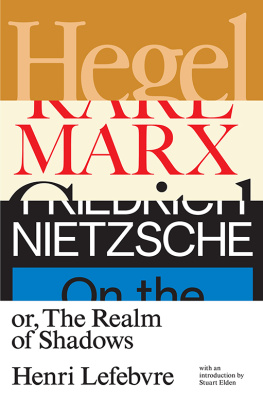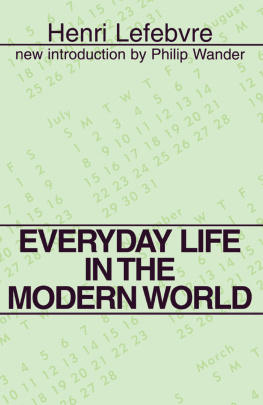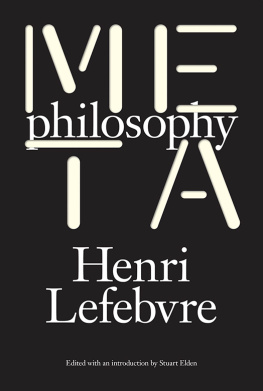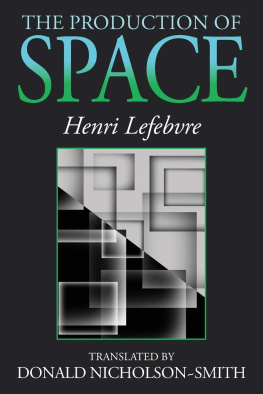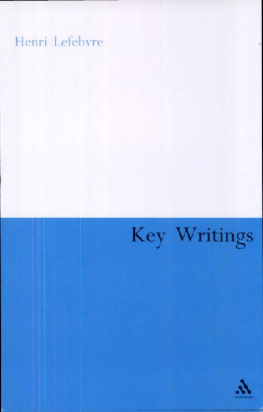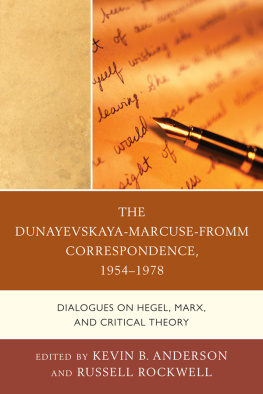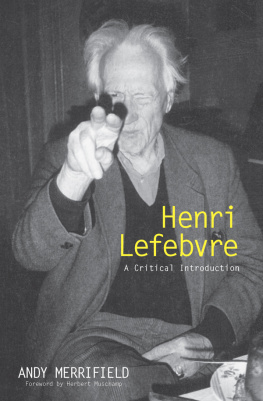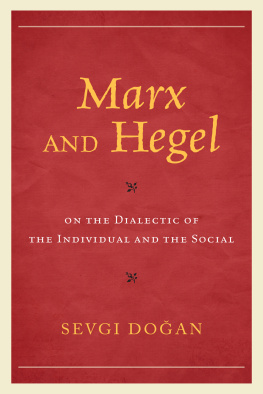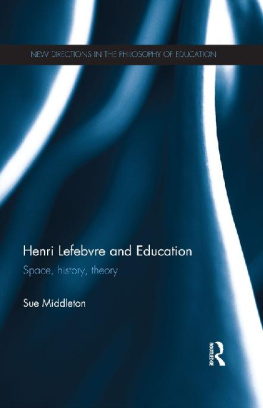Contents

Hegel, Marx, Nietzsche,
or, The Realm of Shadows
Hegel, Marx, Nietzsche,
or, The Realm of Shadows
Henri Lefebvre
Translated by David Fernbach
Introduction by Stuart Elden


This work was published with the help of the French
Ministry of Culture Centre national du livre
Ouvrage publi avec le concours du Ministre franais
charg de la culture Centre national du livre
This English-language edition published by Verso 2020
Originally published in French as Hegel, Marx, Nietzsche: ou, le Royaume des ombres
Editions Casterman, 1975
Translation David Fernbach 2020
Introduction Stuart Elden 2020
All rights reserved
The moral rights of the authors have been asserted
1 3 5 7 9 10 8 6 4 2
Verso
UK: 6 Meard Street, London W1F 0EG
US: 20 Jay Street, Suite 1010, Brooklyn, NY 11201
versobooks.com
Verso is the imprint of New Left Books
ISBN-13: 978-1-78873-373-1
ISBN-13: 978-1-78873-694-7 (HB)
ISBN-13: 978-1-78873-374-8 (UK EBK)
ISBN-13: 978-1-78873-375-5 (US EBK)
British Library Cataloguing in Publication Data
A catalogue record for this book is available from the British Library
Library of Congress Cataloging-in-Publication Data
Names: Lefebvre, Henri, 1901-1991, author.
Title: Hegel, Marx, Nietzsche, or, The Realm of Shadows / Henri Lefebvre ; translated by David Fernbach ; introduction by Stuart Elden.
Other titles: Hegel, Marx, Nietzsche. English
Description: English-language edition. | Brooklyn : Verso Books, 2020. | Includes index.
Identifiers: LCCN 2019001975| ISBN 9781788733731 (alk. paper) | ISBN 9781788736947 (hardback : alk. paper)
Subjects: LCSH: Hegel, Georg Wilhelm Friedrich, 1770-1831. | Marx, Karl, 1818-1883. | Nietzsche, Friedrich Wilhelm, 1844-1900.
Classification: LCC B2948 .L3513 2020 | DDC 193--dc23
LC record available at https://lccn.loc.gov/2019001975
Typeset in Minion Pro by Hewer Text UK Ltd, Edinburgh
Printed and bound by CPI Group (UK) Ltd, Croydon CR0 4YY
Contents
The system of logic is the kingdom of shadows to dwell and work in this shadowy realm is the absolute cultivation and discipline of consciousness.
Hegel
The spirit of theory, once it has won its inner freedom, tends to become practical energy: it leaves the realm of shadows and acts as will on outward material reality.
Marx
I will complete my statue: for a shadow came unto me the stillest and lightest of all things once came unto me! The beauty of the Superhuman came unto me as a shadow.
Zarathustra
Three Stars, One Constellation:
Introduction to Hegel, Marx, Nietzsche
Stuart Elden
__________________
Hegel, Marx, Nietzsche, or, The Realm of Shadows was first published in 1975, between The Production of Space (1974) and Lefebvres four-volume study De ltat (19768).
Hegel, Marx, Nietzsche is a summation of Lefebvres considerable debt to these three thinkers, and its organization is clear. It is structured as three main chapters, files or dossiers on each thinker, framed by a long introductory chapter on triads and a conclusion. Lefebvre suggests that the modern world is Hegelian, Marxist and Nietzschean, and while each of those claims separately is not paradoxical, put together they suggest an irreconcilable tension. How these aspects might be understood, and their relations teased out, is the focus of the study. Each thinker grasped something of the modern world, and shaped Lefebvres own reflections accordingly.
Lefebvre makes the claim that Hegelian thought can be summarized by the word and concept of the state, Marxism through the social and society, and Nietzsche through civilisation and its values. The state and its relation to civil society is of course the focus of Hegels Elements of the Philosophy of Right, and there is much else in his work, but Lefebvre stresses the political here. To take the state as the focus would be a Hegelian view of the world, but there is also a Marxist view, where the states relations to civil society, classes and industrial change are paramount. Yet this too neglects things that Lefebvre thinks are important, and he finds these in Nietzsche. This would include the assertion of life against impersonal political and economic processes, a stress on the importance of the arts of poetry, music and theatre, coupled with the hope of the extraordinary, the surreal and the supernatural.
The term royaume des ombres, the realm or kingdom of shadows, or the underworld, is from Hegels Greater Logic, although it is also used in Marx, and in Thus Spoke Zarathustra, Nietzsche declares that the overman appears like a shadow. These three passages form the epigraphs to the present work.Lefebvre likening the three thinkers to three stars in the sky three stars in a single constellation:
Three stars gravitate, eliminating lesser or invisible planets, above this world in which shadows dance: ourselves. Stars in a sky in which the sun of intelligibility is no more than a symbol and no longer offers anything in the way of a firmament. Perhaps these stars vanish behind clouds hardly less obscure than the night
In myth, from the poetry of Homer to the Divine Comedy, the realm of shadows possessed an entrance and exit, a guided trajectory and mediating powers. It had gates, those of an underground city, overshadowed by the earthly city and the city of God. Today, where are the gates of the realm of shadows? Where is the way out? (p. 49)
The links and tensions between Hegel and Marx are well known, and Lefebvre explores some of them here. Lefebvre argues that there is also much common ground between Marx and Nietzsche their atheism and materialism; their critique of Hegels political theology, and of language, logos and the Judeo-Christian tradition; the stress on production and creation, and the body though there is equally obviously much to contrast. Lefebvre suggests that Nietzsches proclamation that God is dead has tragic repercussions more than simple atheism and naturalism; that for Nietzsche rationality is not just limited but also illusory; and that production and society are the focus for Marx, creation and civilisation for Nietzsche (pp. 19293). Equally, while Marx renders Hegels dialectic materialist, Nietzsche makes it tragic. Civilisation, while it is discussed here and there in Marx, is distinct from the mode of production, and is most developed in Nietzsche. In Nietzsche, poetry and art take the place of knowledge, and the oeuvre is more important than the product. Nietzsche is obviously more interested in the individual, Marx the collective. While for Hegel and Marx it is the notion of Aufhebung lift up, abolish or supersede which characterizes the transitions of history, for Nietzsche it is the notion of berwindung overcoming (pp. 26, 31).
We might further explore or challenge aspects of each of those readings, but Lefebvre works through each thinker in detail in turn in this study, and the strengths or limits of his readings can now be evaluated by his Anglophone readers. Instead, in this Introduction, I want to step back and discuss how Lefebvre reached the point where he could make these claims.
Marx
Lefebvre is best known as a Marxist, and one of his continual claims was that Marxism provides the essential framework to his ideas. He was a member of the French Communist Party between 1928 and 1958, but while he distanced himself from its organizational forms, he never moved away from this framework of thought. Lefebvre would often claim that he was interested in showing how Marxist ideas could be brought to bear on problems or issues that Marx himself had only treated in minor ways, if at all.

